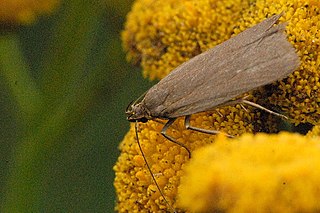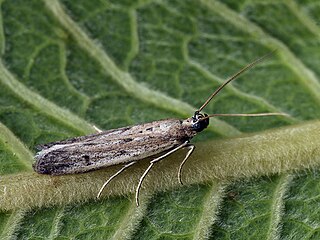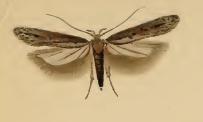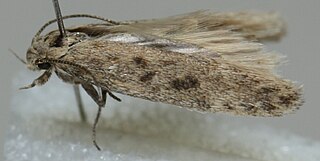
Leucanthemum vulgare, commonly known as the ox-eye daisy, oxeye daisy, dog daisy, marguerite and other common names, is a widespread flowering plant native to Europe and the temperate regions of Asia, and an introduced plant to North America, Australia and New Zealand.

Leucanthemum is a genus of flowering plants in the aster family, Asteraceae. It is mainly distributed in southern and central Europe. Some species are known on other continents as introduced species, and some are cultivated as ornamental plants. The name Leucanthemum derives from the Greek words λευκός – leukos ("white") and ἄνθεμον – anthemon ("flower"). Common names for Leucanthemum species usually include the name daisy, but "daisy" can also refer to numerous other genera in the Asteraceae family.

Scrobipalpa is a genus of moths in the family Gelechiidae. Euscrobipalpa has sometimes been treated as a distinct subgenus, or even as a full genus, but is generally no longer recognised as valid, following Ponomarenko & Park (2007).

Crambus perlella is a species of moth of the family Crambidae. It is found in Europe and east across the Palearctic.

Scrobipalpa acuminatella is a moth of the family Gelechiidae. It is found in most of Europe, as well as Turkey, southern Siberia, Central Asia and China (Anhui). It was recently reported from Canada, with records from Ontario and Québec.

Homoeosoma nebulella, the Eurasian sunflower moth, is a moth of the family Pyralidae. It is found in Europe, Russia, Anatolia, the Middle East and West Africa. The wingspan is 20–27 mm.

Glyphipterix simpliciella, the cocksfoot moth, is a species of moth of the family Glyphipterigidae.

Scrobipalpa artemisiella is a moth of the family Gelechiidae. It is found in most of Europe, Turkey and Syria through the Caucasus and Central Asia to Irkutsk and Mongolia. It has also been recorded from North America, but this records requires confirmation.

Scrobipalpa atriplicella, the goosefoot groundling moth, is a moth of the family Gelechiidae. It is found from most of Europe throughout Asia to Kamchatka and Japan. It is an introduced species in North America.
Scrobipalpa indignella is a moth of the family Gelechiidae. It is found in southern Russia, Ukraine, and from the Near East and Middle East to Afghanistan and China (Xinjiang).

Scrobipalpa obsoletella, the summer groundling, is a moth of the family Gelechiidae. It is found in most of Europe, Turkey, the Caucasus, from Iran to Asian Russia (Transbaikal) and Mongolia. It has also been recorded from New Zealand, South Africa and North America, where it is probably an introduced species. The habitat consists of coastal salt marshes and sandy beaches.

Scrobipalpa samadensis, the buck's-horn groundling, is a moth of the family Gelechiidae. It is found in most of Europe and Russia.
Scrobipalpa portosanctana is a moth of the family Gelechiidae. It was described by Henry Tibbats Stainton in 1859. It is found in Spain, France, Italy, Croatia, as well as on Sardinia, Corsica, Sicily, Malta and Madeira. It is also present in North Africa and the Near East.
Scrobipalpa ergasima is a moth of the family Gelechiidae. Edward Meyrick first used the scientific name in 1916. It is found in the Mediterranean Region and on the Canary Islands. Outside of Europe, it is found in Egypt, Saudi Arabia, the Democratic Republic of the Congo, Namibia, South Africa, Sudan, Australia, India, Indonesia, Myanmar and Pakistan.
Scrobipalpa arenbergeri is a moth in the family Gelechiidae. It was described by Povolný in 1973. It is found in Austria, Hungary, the Czech Republic, Slovakia, Croatia, Italy, Ukraine, the southern Ural mountains and Transbaikal.
Scrobipalpa remota is a moth in the family Gelechiidae. It was described by Povolný in 1972. It is found in northern Iran, Palestine and Algeria.
Scrobipalpa geomicta is a moth in the family Gelechiidae. It was described by Edward Meyrick in 1918. It is found in South Africa.
Scrobipalpa sibila is a moth in the family Gelechiidae. It was described by Edward Meyrick in 1921. It is found in Mozambique.
Scrobipalpa hyoscyamella is a moth in the family Gelechiidae. It was described by Henry Tibbats Stainton in 1869. It is found in Portugal, Spain, southern France, Austria and Romania.
Scrobipalpa selectella is a moth in the family Gelechiidae. It was described by Aristide Caradja in 1920. It is found in Tunisia, Greece, Turkey, Uralsk, Ukraine, Kazakhstan, China and Mongolia.









